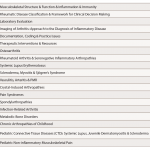Young points out that advanced training enables her and the rheumatologist to plan together a patient’s treatment plan. This allows for a coordinated course of treatment in a timely manner. Reducing delays in treatment is also a concern for Langford. “Assisting health professionals to develop treatment protocols for rheumatology patients is especially good for physical therapy programs, as delays in necessary therapy can adversely affect outcomes,” Langford says.
Kiely sums up: “Knowledgeable nurse practitioners, physician assistants, and other [clinicians] are especially helpful to newly diagnosed patients during their initial period of vulnerability. We can work together to establish treatment programs including follow-up care—all of this while we continue to monitor, educate, and communicate with our patients.”
“Our philosophy is to empower patients by arming them with knowledge,” adds Langford. “We can’t do that unless we ourselves have that knowledge.” The ARC offers a way to fulfill that philosophy.
Ann Kepler is a medical journalist based in Chicago.



